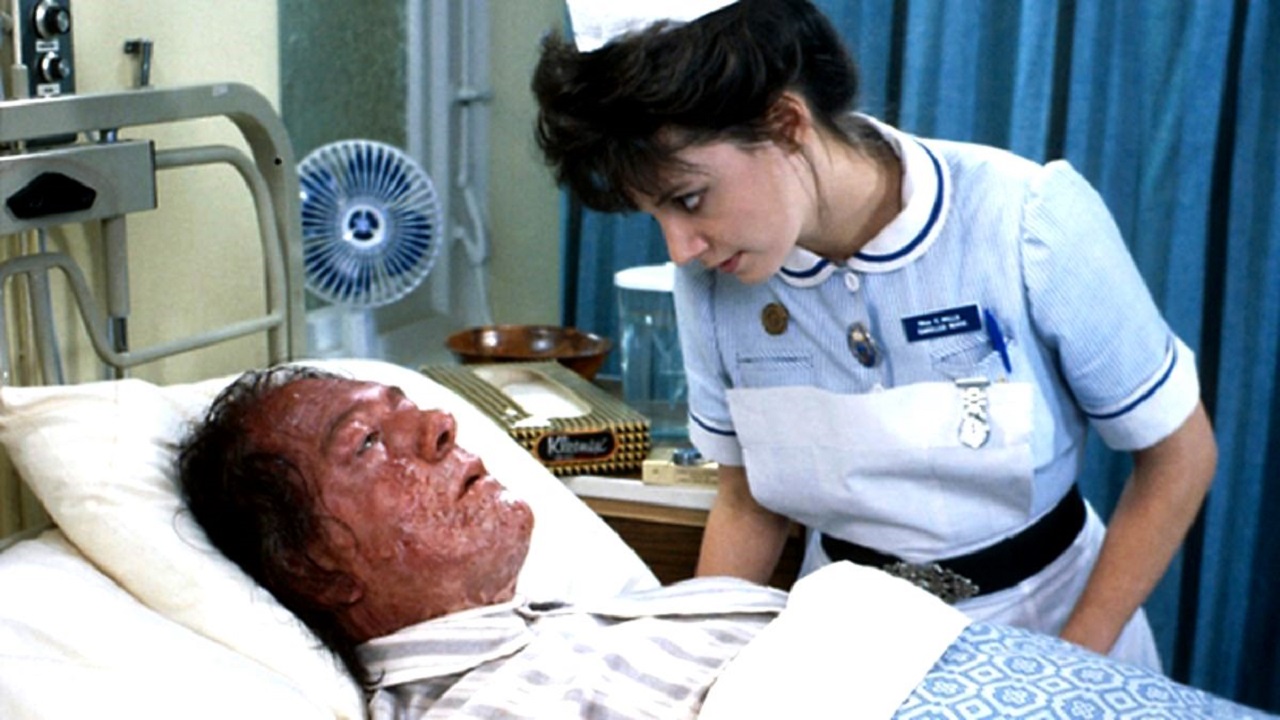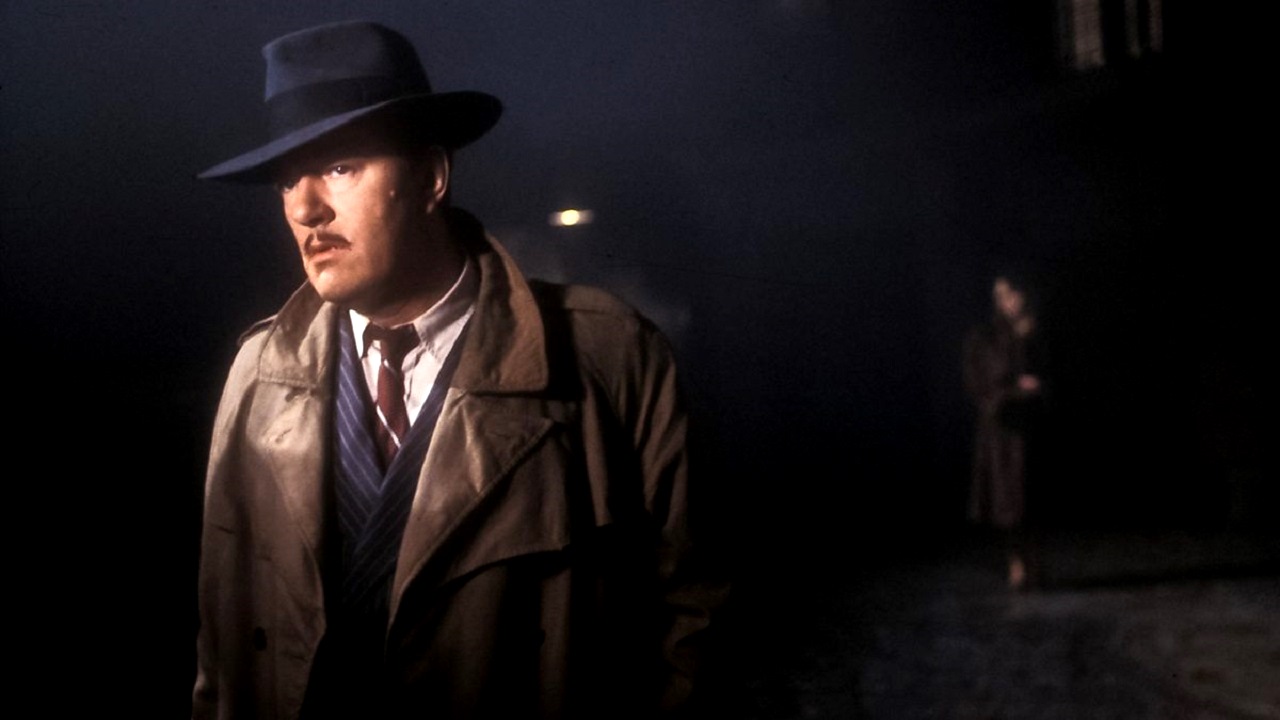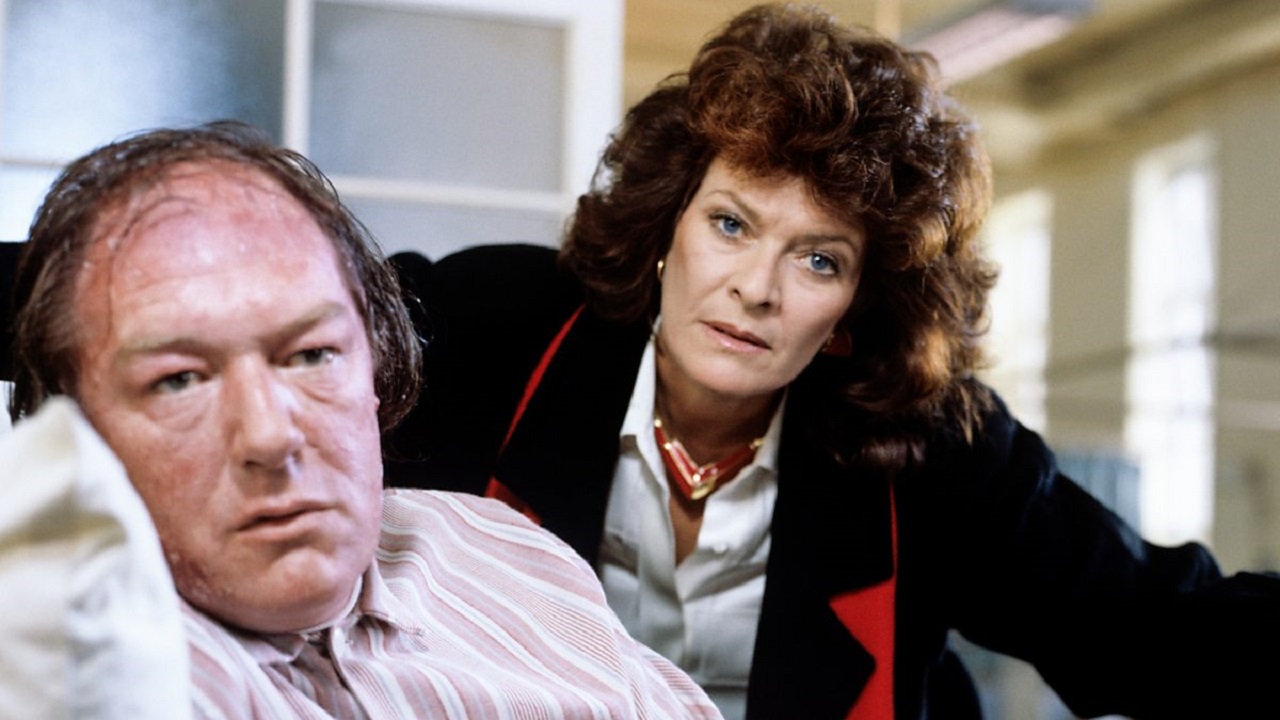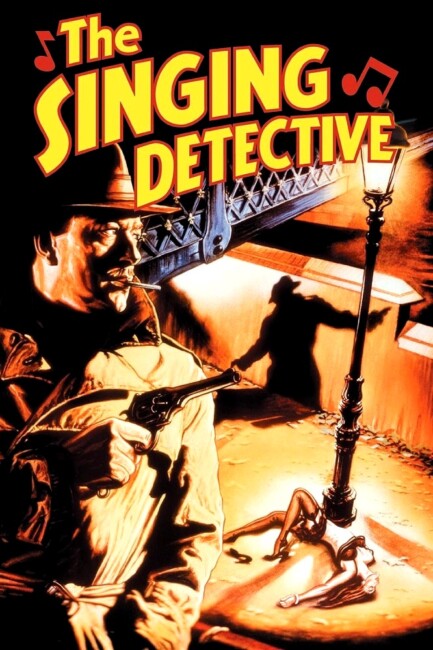UK/Australia. 1986.
Crew
Director – Jon Amiel, Teleplay – Dennis Potter, Producers – John Harris & Kenith Trodd, Photography – Ken Westbury, Visual Effects Designer – Mat Irvine, Makeup Design – Frances Hannon, Design – Jim Clay & Maria Djurkovic. Production Company – BBC-tv/Australian Broadcasting Corporation.
Cast
Michael Gambon (Philip Marlow), Patrick Malahide (Mark Binney/Mark Finney/Raymond), Janet Suzman (Nicola Marlow), Alison Steadman (Betty Marlow/Lili), Joanne Whalley (Nurse Mills), Bill Paterson (Dr Gibbon), Lyndon Davis (Philip Aged 10), David Ryall (Mr Hall), Gerard Horan (Reginald Dibbs), Ron Cook & George Rossi (Mysterious Men), Jim Carter (Mr Marlow), Charles Simon (George Adams), Leslie French (Noddy Tomkey), Janet Henfrey (Schoolteacher), Imelda Staunton (Staff Nurse White), Kate McKenzie (Sonia), Charon Bourke (Amanda), Simon Chandler (Dr Finlay), Badi Uzzaman (Ali), Sharon D. Clarke (Night Nurse), Richard Pescud (Consultant), Thomas Wheatley (Registrar), Geff Francis (Porter), Joan White (Mrs Adams)
Plot
Philip Marlow, a writer of cheap detective novels, is hospitalised with psoriatic arthropy, which has left his skin hideously peeling and he unable to walk or use his hands. The angry and bitter Marlow lies helpless in his hospital bed, railing against the banality of those around him. As his mind wanders, Marlow begins to reconstruct the world of one of his pulp novels ‘The Singing Detective’ in his head. In the story, private eye Philip Marlow, who also works as a cabaret singer, is hired by Mark Binney after a Russian prostitute that Binney slept with is found murdered. In investigating, Marlow becomes wound up in a racket involving Nazis and Communists and is hunted by two hitmen. In the hospital, Marlow’s mind also wanders back to when he was aged ten and saw his mother with another man in the woods and an incident where a crazed teacher tormented him. Marlow is sent to psychiatrist Dr Gibbon to help him find a more positive frame of mind. In talking to Gibbon, Marlow begins to see how incidents from his life bled over into and became reflected in ‘The Singing Detective’. At the same time, Marlow’s estranged wife Nicola comes to visit him, suggesting he get back to work and mentioning an offer to buy the film rights to ‘The Singing Detective’. Marlow also realises that Nicola is sleeping with producer Mark Finney. Finney is planning to pass Marlow’s screenplay for ‘The Singing Detective’, which Nicola has stolen, off as his own and she is trying to seduce Marlow into signing away the rights. As he and Nicola hatch their scheme, Finney becomes concerned about an alarming number of parallels he finds between himself and the character of Binney in the script.
From the late 1960s on, Potter began to throw himself into writing for the screen, producing a great body of tv plays, mini-series and occasionally movies. These included the likes of The Mayor of Casterbridge (1978), Pennies from Heaven (1978), Blue Remembered Hills (1979), Dreamchild (1985), Track 29 (1988), Lipstick on Your Collar (1993) and Karaoke (1996) to name but the most famous. Potter’s work frequently falls into fantasy where he blurs the lines between daydream and dreamer, fiction and author. He frequently features characters who express themselves in lip-synched musical daydreams or to whom fantasy and fiction are often more real than the physical world around them. (A list of Dennis Potter’s body of genre works is at the bottom of the page).
Potter claimed that he was offended by the constant suggestion that The Singing Detective was a work of autobiography and said that it was the least autobiographical of his works. One is not sure how to regard this as Potter often actively constructed elements of his life in a way that he let it bleed into what he wrote, yet at the same time always kept a Machiavellian distance from it. Whatever the case, there are an extraordinary number of similarities between Potter’s life and the character of Philip Marlow in The Singing Detective:- Potter was hospitalised with psoriatic arthropy but made a near total recovery due to new drug regimens; Potter, like Marlow, grew up in the Forest of Dean during World War II; his father was a miner; his mother left his father to go and stay with her family when he was ten; Potter had a lifetime fascination/revulsion with sex (in large part due to being sexually abused by an uncle at the age of ten); while there is also the sense of class conflict with a child from a rural area of England trying to be accepted.
Potter was always willing to push the limits of on-screen taboos in his work. The Singing Detective caused outrage when it screened in Britain as it was the one of first dramatic tv shows to ever use the ‘f’ word in a public broadcast and for showing Patrick Malahide’s genitalia in the scene where he has sex with Alison Steadman. The most outrageous scene though is the one where nurse Joanne Whalley is greasing Michael Gambon’s skin from head to foot and he ejaculates after she massages his penis.

The Singing Detective is a genuinely ground-breaking work and makes for compulsive viewing. There was nothing that had ever been attempted on tv like it before (or since for that matter) in the creation of such an extraordinarily multi-layered work and in Potter’s breathtaking ways of breaking conventional narrative. It is a joy to watch – just the sublime playfulness of the way Potter puns around with the cod-Mickey Spillane Film Noir-styled dialogue – like the turns of phrase that come in Michael Gambon’s voiceover: “Oh, it’s so cold. The sort of cold where lonesome cats cry for hours on the broken slits. But tonight there’s not a pussy in sight. Not even a four-legged one. All good people have gone to bed. And some bad ones too.”
As always in a Dennis Potter work, Potter loves the play of fiction and Meta-Fiction. In his works, ordinary people wander off to express themselves in lip-synched 1940s/50s musical numbers; or characters from fiction or people’s imagination are constantly intruding into the real world. This blurring of the real and the imagined became a recurring fascination in Potter’s work – as Marlow himself says here: “Sometimes these hallucinations are better than the real thing. People can sing in them and dance. I don’t mind.” It could be Dennis Potter himself speaking directly to us. However, The Singing Detective went far beyond the mere meta-fictions or the bittersweet whimsy that Potter gave us in Pennies from Heaven, which featured characters leading downbeat lives bursting into lip-synched Golden Oldie songs. Here Potter delves down into the psychological undertow that lies beneath a writer’s fiction, querying the subconscious influences of half-buried memories and the way these are expressed in fiction. As Potter frequently said, The Singing Detective was a psychological detective story.
In Dennis Potter’s wilful flaunting of conventional linear narrative, The Singing Detective is what might be the first stream-of-consciousness tv series. On one level, it is a story about a man in a hospital bed; on another level, it is his imagined reconstruction of one of his cheap detective novels where the characters from the hospital and later from his childhood symbolically take on roles; on another, it is about Marlow’s childhood and the way we see that it came to influence both his life and fiction; and fourthly there is another entire level of story of what we come to realise is Marlow’s distrust and paranoia about Nicola and Finney scheming to steal the script where elements from the detective story start to have some very peculiar mirrorings (a distinctive feature of Dennis Potter’s later Karaoke). A number of the actors play multiple roles between different levels of the narrative.
The mini-series is at its weirdest when Dennis Potter begins to have the characters noting the uncanny reflections between their lives and the script or suddenly start talking in punctuation. Things becomes completely bizarre towards the end when the two heavies from the detective story get angry when they realise that they are only supporting characters that don’t even have names and set out to confront the author. The show culminates in an amazingly surreal climax where the two thugs come to eliminate the hospitalised Marlow and they, pursued by the detective story version of Marlow, engage in a shootout in the hospital ward with bullets flying everywhere as the nurses and patients carry on without noticing until they are shot.

The Singing Detective seems to scour something deep and personal on Dennis Potter’s part. He is determined to open himself/the character of Marlow up with unflinching regard – be it showing us the crippling physical effect that psoriatic arthropy had on him – the first time that we see Michael Gambon covered from head to toe in sores is shocking. We gain a sense of the nightmarish of the situation in the scenes with Michael Gambon reduced to tears explaining how near to madness he is, or of a demented old patient on top of Gambon humping him as he remains powerless to get him off while the other patients and ward nurse only stand around laughing. There is a genuine vitriol to Michael Gambon’s performance in the way he allows Potter’s often extraordinarily misanthropic dialogue to roll off his tongue, taunting the dying George or cheerfully tossing off racial slurs against his Indian bed neighbour. It feels at times as if Dennis Potter is bleeding venom against all the figures in his life who have done him wrong – his wife, his mother, resentments that have festered since childhood, anger at the small-minded tyranny of the British public school system. It certainly makes for uncomfortable viewing, while equally the brutal honesty also makes for utterly captivating viewing.
There is also a really black sense of humour to The Singing Detective. You are certain that Dennis Potter sat during the period of his hospitalisation taking mental notes on the characters around him for later incorporation into the script. He gets down perfectly the banality and petty tyranny of a British public hospital – the pompous doctors, the autocratic and small-minded nurses, the maddening banality of a Christian revival group come to sing hymns to the ward. There is a scene that becomes increasingly blacker with Charles Simon as Michael Gambon’s neighbouring patient George begging for a cigarette, saying “It never did nobody any harm,” despite talking about pains in his chest and slavering about the aftermath of WWII where German girls could be bought for two packets of cigarettes, before he expires. Nothing in the mini-series is blacker than Potter’s sudden bursts of surrealism – like Michael Gambon’s long tearful soliloquy about how he is near to madness, followed by the doctors standing around discussing him as though he is not there, which suddenly bursts into a song and dance chorus of Dem Bones; images of old codgers turning to Gambon and bursting into lip-synched song; or the whole ward singing in chorus, including an old man suffering from Parkinson’s keeping the beat with his jitters.
The series gets superb performances from all of the principals. Along with the previous year’s BBC Oscar Wilde biopic mini-series Oscar (1985) in which he played the title role, The Singing Detective was the first time that the world at large had the opportunity to notice Michael Gambon in a big way. Joanne Whalley, aged only 22 and just before she found international fame in works like Willow (1988) and Scandal (1989) and marrying Val Kilmer, has never been lovelier on screen as one of the nurses.
All the peripheral characters are wonderfully played – from Mr Hall (David Ryall) and his constant petty whinings and inability to ask for a bedpan to the senile George (Charles Simon) in the next bed being slapped into place by his wife and the hysterically funny scenes with Simon Chandler’s pompous doctor trying to hit George’s knee. There is a frighteningly insane performance from Janet Henfrey as young Marlow’s cruelly authoritarian schoolteacher. The scenes with her calling down the wrath of God after finding that someone has shat on her desk and psychologically torturing young Philip in front of the class make for some of the most gruelling scenes in the series.

One can even see a young David Thewlis who gets about one line as a soldier on a train eyeing Alison Steadman’s legs. There’s also a young, relatively unknown Imelda Staunton, later of Harry Potter and The Crown (2016-23) fame, along with a host of awards and nominations, as a nurse with a very severe manner. There is also a wonderfully haunting and distinctive accordion score.
The Singing Detective was later remade as a film version The Singing Detective (2003) from director Keith Gordon starring Robert Downey Jr in the Michael Gambon role and with the locale transferred to the USA but this widely missed any of the effectiveness or literate strength of the tv mini-series.
Dennis Potter’s other genre works are:– the tv play Alice (1965), part an adaptation of Alice in Wonderland (1865), part an examination of the relationship between Lewis Carroll and Alice Liddell; the highly controversial tv play Son of Man (1969), a Passion Play that depicts Jesus Christ as racked with anxiety and doubt; the tv play Angels Are So Few (1970) about a housewife who receives a visit from a man who claims to be angel; the meta-fiction Follow the Yellow Brick Road (1972) where a man believes he is a character in a tv show; the controversial tv play Brimstone and Treacle (1976/1987) about a man who claims to be The Devil; the mini-series Pennies from Heaven (1978) concerning Depression-era people who are constantly expressing their inner turmoils in lip-synched musical fantasy sequences; the tv play Blue Remembered Hills (1979) where Potter conducted the unique device of depicting his childhood during the War with adults cast in the roles of children; Pennies from Heaven (1981), the Hollywood remake of the earlier mini-series; Brimstone and Treacle (1982), a film remake of the tv play; Dreamchild (1985) about the life of the aging Alice Liddell; the bizarrely surreal Track 29 (1988) with Gary Oldman as Theresa Russell’s possibly imaginary lost son; the mini-series Blackeyes (1989) where the character in a trashy sex novel comes to life to protest her exploitation; Lipstick on Your Collar (1993), a work very similar to Pennies from Heaven where the people in a government office in the 1950s express their fantasies in musical numbers; the tv play Midnight Movie (1994) where an old horror movie screening on tv and a mysterious unsolved murder in the present blur together; and Cold Lazarus (1996), the final work written by Potter where the memories of dead writer are ransacked by the people of the future.
After working on various plays for British tv, director Jon Amiel found considerable acclaim as a result of The Singing Detective and went onto a Hollywood career making the likes of Queen of Hearts (1989), Aunt Julia and the Scriptwriter (1990), Sommersby (1993), Copycat (1995), Entrapment (1999), The Core (2003) and Creation (2009), among others.
Trailer here
Full mini-series available beginning with Part 1 here


